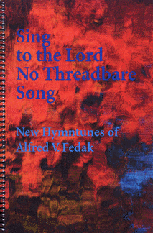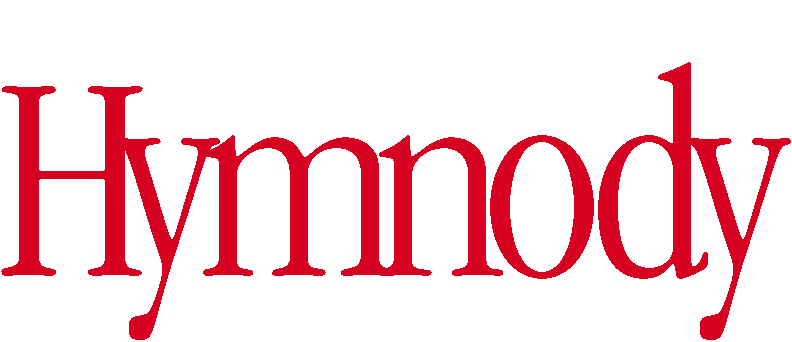|
|
 |
Sing to the Lord No Threadbare Song:
New Hymntunes of Alfred V. Fedak
Hymn tune collection
Author Alfred V. Fedak
Foreword by Carl P. Daw, Jr.
Released July 2001
Catalog no. 125-016 (Soft-cover, 86 pp.)
Price $18 (U.S.)
Order now! 
 Order PDF download!
Order PDF download!


 Review Review
"Selah Publishing Co. has again presented a comprehensive collection of new hymns by Alfred Fedak, Minister of Music and the Arts at Westminster Presbyterian Church in Albany, N.Y., written since the publication of his 1990 hymnary. The wonderfully vivid cover makes you instinctively reach for the book.
Carl Daw, in his foreword, compares Fedak's tunes to frames that support and elucidate the texts, fitting the proper frame to the intent of the text. Fedak is an excellent craftsman who seeks to find the music in each text. Although only nine of the tunes are in parts, the general tone of the majority of the tunes is traditional, with many folk-like in nature. All of his tunes are accessible to the average congregation and easy to play. They work equally on the organ and the piano.
ECCE DEUS is an enganging tune that has a wonderful lilt and works well with its two texts.
CALLAHAN and NEW WORLD are simple melodies, to simple Richard Leach texts which produce two lovely hymns. THE FALCONER is also a tune that is a perfect frame for the great Leach text. A nice James Brumm text, "By Faith Have God's Saints Walked," has a fitting tune that takes the singer on a walk through biblical history. Herbert O'Driscoll's poetic "Three Tall Trees Grew on a Windy Hill," has a rhythmic sea chanty type tune, perfect for the text. Working in a church with a rich history of rhythmic music, I especially appreciated this hymn....
The tunes are listed in alphabetical order which will make it easy to find your favorites. Since Fedak is such a good craftsman, he writes excellent tunes at both ends of the spectrum, very traditional to more modern. . . .All in all, it is a very usable book with much to offer." --The Hymn, January 2003
Description
A collection of the recent hymn tunes by Fedak, mostly written since the publication of The Alfred V. Fedak Hymnay in 1990. Includes texts by Richard Leach, Rae E. Whitney, Gracia Grindal, Edith Downing, Timothy Dudley-Smith, Carl P. Daw, Jr., James Quinn, Thomas Troeger, and many others. These 50 hymns can be used throughout the year for various church seasons and general use. They all exhibit his keen attention to texts and their nuances, while being eminently singing and memorable for a congregation. Many will be widely used for years to come, just like his earlier tunes.
Introduction by Alfred V. Fedak
I have always believed that every worthy hymn text contains within its lines the makings of its ideal hymn tune partner. That is, the particular pace and rhythms of a hymn text, its unique shape, structure, and inflections, determine almost inevitably what its best tune will look like and sound like. The moment one accepts this premise, the composition of hymn tunes reveals itself to be less a process of invention, and more a process of discovery. The true task becomes one of continuously disclosing the music which is already inherent in the hymn texts themselves. By bringing out that which is already there, the strongest possible connections can be made between text and tune, and between message and singer.
The idea of hymn tune composition-as-discovery leads to several corollaries. First, as far as the individual composer is concerned, a text can only yield up one "ideal" tune. Other composers may discover different melodies because they read the text in different ways. But I have always found it exceedingly difficult to write two equally convincing tunes for the same text.
Secondly, the process of composition-as-discovery tends to produce hymn tunes which are so closely married to their intended texts that they resist all efforts to pair them with other words. For this reason the majority of my tunes are inextricably linked with the words for which they were composed. Only a relatively few have enjoyed a life independent of the texts for which they were written.
Finally, the process of hymn tune composition-as-discovery rapidly leads one to the realization that certain texts are inherently more musical than others. I am most grateful for the work of the text writers, both living and dead, whose words I have been privileged to set to music over the years. Their texts which appear in this volume are among those to which I have been most strongly and personally drawn, and these, without exception, have been the most musically suggestive to me. It is my sincere hope that this little book will in some way contribute to their being more widely known and sung.
My thanks go to David and Virginia Schaap of Selah Publishing Co. for their friendship, tireless support, and encouragement. Thanks also to Carl P. Daw, Jr., good friend and sometime collaborator, whose poetry continues to amaze, impress, and inspire me. And lastly I thank my wife Susan for her constant love and unerring musical counsel.
--Alfred V. Fedak, Albany, N.Y., February 12, 2001
Foreword by Carl P. Daw, Jr.
The interplay between the words of a hymn and their musical setting is very like that between a picture and its frame. A well-chosen, well-crafted frame can call attention to colors and patterns that would otherwise recede without notice and can give a sense of satisfying scope and focus to a canvas that seemed vague or pointless before it was provided with an effective border. Like a jeweler creating precisely the right foil to set off the brilliance of a gem, the crafter of frames works to achieve a pairing so seemingly inevitable that it is impossible to tell whether the frame was created for the picture or the picture for the frame.
One of Al Fedak's remarkable gifts as a composer of hymn tunes is his keen sense of what musical frame will most effectively support and elucidate the text at hand. One measure of his almost subversive skill in doing so is that, after becoming familiar with his tune for a text, you will find it almost impossible to read through that text without adopting the patterns of his tune: the rhythms of its phrases, the rise and fall of its melodies, the shaping of its cadences. Most of the time his tunes are so specific to the text involved that they will serve no other, but sometimes he crafts a tune so flexible and multi-hued that it can move from one text to another with no loss of strength or brilliance. (ECCE DEUS, for example, was composed for a text not in this collection yet serves admirably here for both "Christ the Vine" and "Wordless Song within the Waters.")
As a text writer whose words have often benefited from their sympathetic treatment in one of his tunes, I count it a great privilege to commend this collection both to those who are already familiar with Al Fedak's work and to those who may be discovering him here for the first time. Neither group will be disappointed, for what you will find here is indeed no threadbare song but an ample tapestry of melody, harmony, and rhythm, joined with skill and grace.
If you would like your comments on this publication to appear here, fill out our online review comments form.
Sign up our
Sign up our
|




